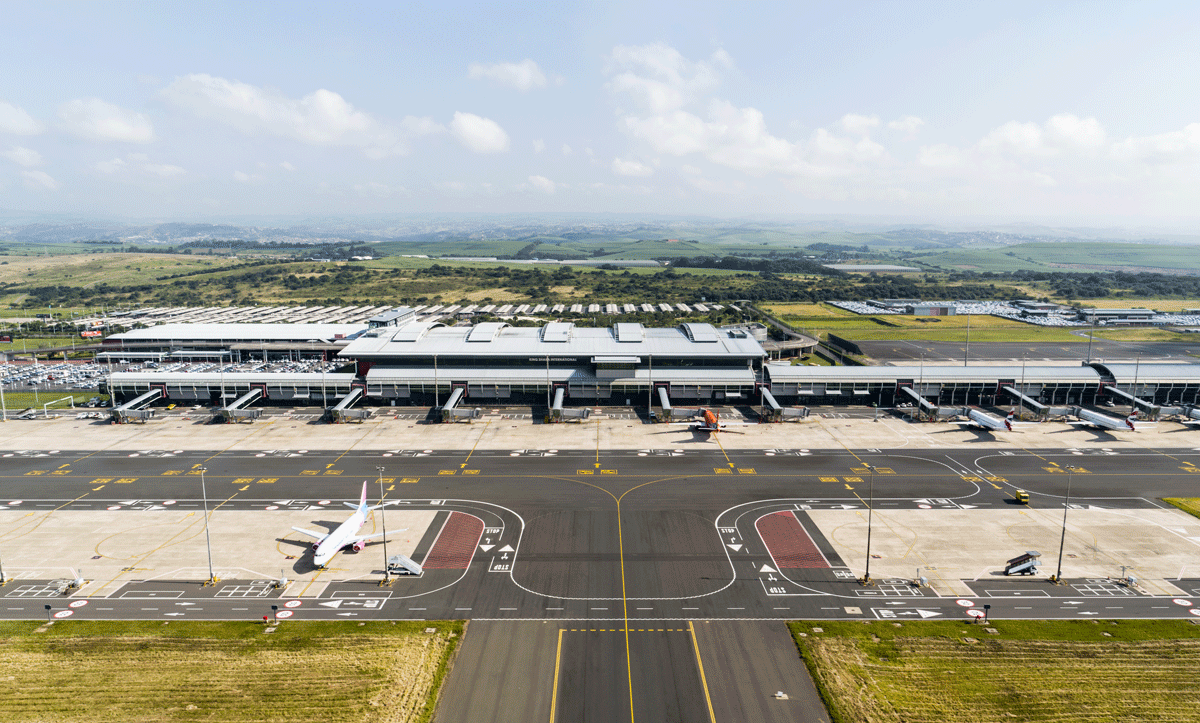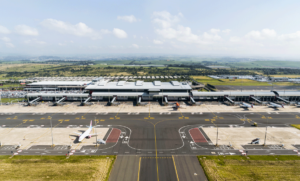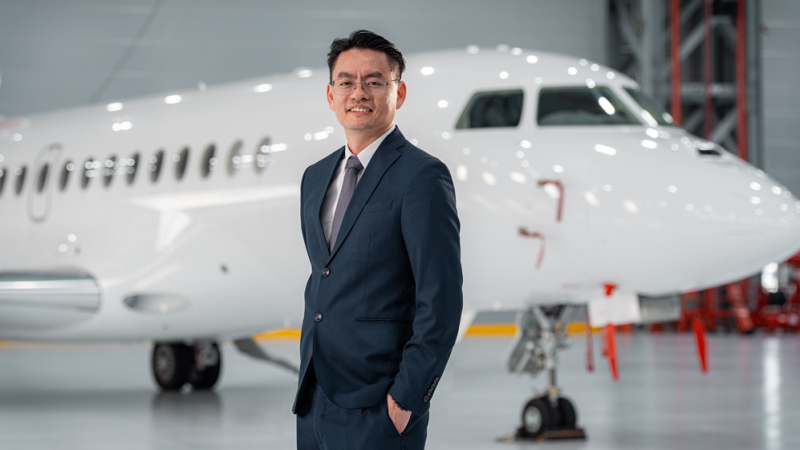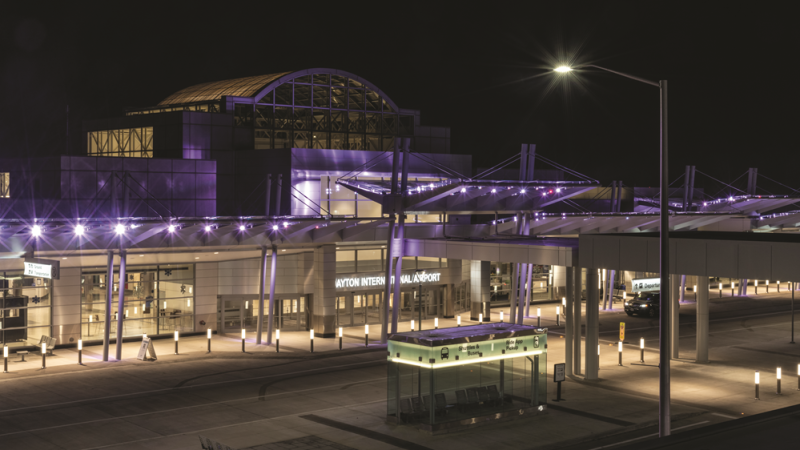Airports Company South Africa Limited is a majority state-owned South African airport management company that has been operating for over 30 years, operating nine of South Africa’s airports including King Shaka International Airport.
Our ACSA values are passion, results, integrity, diversity and excellence,” says Nkosinathi Myataza, ACSA Regional General Manager. “We are not an isolated company, but part of a range of intermodal transport solutions while contributing to economic activities across the country. We look at transport from the point of view of solutions to better humanity with good governance and sustainable inputs and outputs. We are not just in the business of aviation for the sake of aviation.”
King Shaka International Airport was the first greenfield project undertaken by ACSA using an Engineer, Procure and Construct (EPC) model, where over testing, commissioning and Operational Readiness and Transfer Programmes, management and operations were systematically transferred from Contractors to ACSA. As it was greenfield built, the airport has introduced energy efficiencies as well as water and waste infrastructure to minimise the airport’s impact on the surrounding environment and communities. Environmental compliance and management remain top of the airport’s agenda.
“It was in a space that is very environmentally sensitive, near sugar cane fields and wetlands,” Myataza tells us. “There has been a detailed record of decisions, undertakings and what can be done and not done. King Shaka has responded well to that.”
Among the highlights of the move and construction of the new airport have been the stringent monitoring regimes put in place for the airport to keep track of water and air quality, water usage, emissions, and the effect on local wildlife. The airport’s flight paths were found to intersect with migrating swallows at the time, and so the airport has taken precautions to avoid collisions with aircraft. A Bird Radar specific to this risk and this airport was constructed and installed.
Great attention is being paid as to how this airport facility fits into the air transport networks and other transport modes in the region around the province of KwaZulu-Natal. This then would feed into the thinking around the National Airports Development Framework and National transportation strategy.
“Within ACSA’s strategy of regional integration, King Shaka International Airport is at the forefront of integration within the network of local and provincial airports in the region,” Myataza says. “We play a crucial role in enhancing this network so as to get more people flying, and to facilitate trade through air cargo.” People who had no access to air transport, and goods with no access to broader markets must be taken aboard.

A New Era of Flight
Like anyone in the aviation sector, the ACSA airports experienced various challenges during the Covid-19 pandemic lockdown.
“On the first year ACSA Group lost 2.1 billion rand. On the second year, ACSA Group lost 1.3 billion,” Myataza recalls.
But since the lockdown was lifted the air travel sector has recovered rapidly, and King Shaka International Airport has already reached 78% of its pre-Covid traffic levels. Myataza intends to continue building on that progress, such as putting passenger mobilisation initiatives into place to encourage first-time flyers.
“It’s a relatively new airport, so we are investing in the infrastructure to improve access and encourage flying,” Myataza tells us. “We have had issues with power capacity. Airports have always had back-up generators and Uninterruptable Power Supply Systems to ensure that we do not endanger aircrafts even in the case of a normal power failure. But now we have renewed that capacity, and we are investing in being self-sufficient for power generation.”
To achieve this, Airports Company South Africa is installing solar power plants across its network and intends building its own gas-to-power trigeneration plants for its three main airports.
But an airport’s success is not just about what goes on within the airport grounds. It is also about the place that airport represents, and the reasons people have to go to and from it.
“Our Airlift Strategy, under Durban Direct encompasses local and regional tourism bodies, economic development agencies, trade and industry, airports,” Myataza explains. “We attend conferences and other such platforms like AviaDev Africa, World Routes Conference and Air Service World Congress, on the continent and globally, where we sell not just the airport but the destination, and the region.”
It is an effort to bring in tourism, these entities are building on Durban’s reputation for warm beaches, the wildlife, and the mountain ranges what Myataza called “the beach, the berg and the bush.” At the same time, he wants to draw attention to the airports recovery of air traffic is continuously building both passenger and increasing cargo trade exchange. The unique features of the airport precinct, which include the airport’s strategic location within a special economic zone, and situated 30km from the Port of Durban, intermodal interchange into the region and into the continent is important more especially in the light of the intercontinental African Continental Free Trade Area (AfCFTA) agreement.
 Lessons of Covid
Lessons of Covid
These are only part of the extensive ACSA plans that have been laid out for King Shaka International Airport’s future, but all those plans are guided by the lessons the business took from the Covid pandemic.
“What we have learned from Covid has been channelled into some good initiatives, not just to sustain and build what we have, but to go into new areas we have not been in before,” Myataza says. “ACSA have developed a route development and network strategy that leverages the growth of the municipal airports in the region, increasing the flying public.”
There is a great deal that King Shaka International Airport can offer for both commercial and general aviation, especially for the chartered flights sector as the airport is in the process of finalising a new apron, with a plan to construct in the near future a Fixed Base Operator facility.
“We are also looking at our ground handling and fuel strategy,” Myataza remarks. “We have seen that internationally many airports are managing their own ground handling. We think that could help us in revenue generation while giving us direct control over how baggage and air freight is handled and managed. We want to build in economic empowerment for new entrants into the field including fuel through-putters within our airports.”
But for all the facilities and technologies King Shaka International Airport is deploying, Myataza is insistent that people are at the centre of the airport’s strategy.
“We are building a people-centred culture and strategy,” he says. “We lost quite a few skilled people over Covid, and we are trying to bring those skills back. We are focusing on training and development, creating offers to attract qualified staff who we can put through intensive programs to absorb them into the organisation.”
ACSA invests in skills development programmes for ACSA employees and an employees’ children bursary scheme, while also funding young talent development programmes that include a training programme for trainee engineers and placing interns from various fields across the organisation.
“We also offer bursaries externally to students that focus on the aviation business related studies,” Myataza tells us. “We are focused on transforming our society and be part of building an ethical, competent, capable and capacitated state, through its’ people.”
But all of these ideas contribute to a bigger concept for the ACSA business. One of these being the vast development and opportunities that the Aerotropolis and Airport Cities will bring.
“The environmentally friendly, technologically advanced, economic hub around us is at the core of creating a smart city centred around King Shaka,” he says. “It is a mixed-use development where people can live, work, and socialise.
At the same time, we are focusing on digitalisation. Looking ahead, ACSA is positioning itself as a global airport technology and innovation leader. With a comprehensive roadmap and forward-thinking approach, ACSA aims to set new benchmarks in airport technology, cybersecurity, and the customer experience, paving the way for further advancements in the aviation industry.







